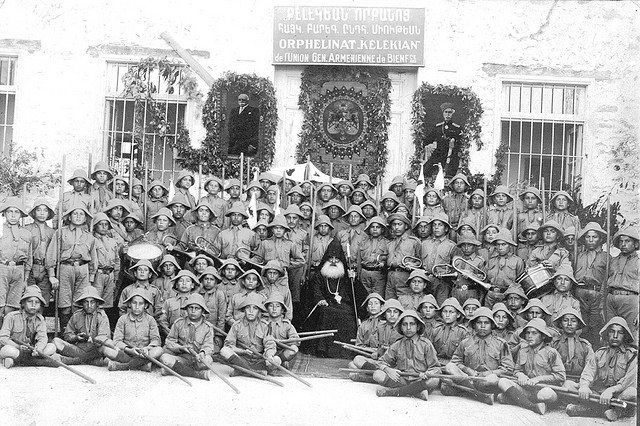Special for the Armenian Weekly
By Missak Vassilian
Translated by Jennifer Manoukian
The following is the account of a 16-year-old Armenian boy’s unexpected encounter with Djemal Pasha, a member of the the Ittihadist triumvirate of WWI, in December 1917. It was given to me by his son, Asbed Vassilian, who sees in this brief exchange a larger story about the resilience and perseverance of the Armenian people.
Clik here to view.

Djemal Pasha (on the back seat)
In 1915, the benevolent Turkish government, in its monstrous plan, did not spare the faculty and students at the Kelegian orphanage in Chork-Marzban (Dortyol), but instead deported them under the guise of a brief excursion. I think a Turkish unit from Adana came specifically to organize the deportation. A handful of students were reunited with their parents, and some of the older students were sent to the Dar-el-Eytem Turkish orphanage in Adana. According to the information we received, barely a few months after arriving at the orphanage, those boys were sent to the deserts of Meskiné and Der-Zor. Finally, around 20 boys, including myself, were transferred to a German orphanage in the village of Harni. After about two years of studying German, Turkish, and other subjects, the German orphanage suffered a severe financial crisis; they used to give us bread made with barley flour that had not been sifted, and even this was difficult for them to secure. During this period of financial crisis, a couple of German officers came to the orphanage and met with the administration. A few days after the officers left, around 20 students who had been studying German for 2 years were assigned to work as translators at the German military’s station in Ayran. The purpose of that military facility was to oversee the train traffic on the narrow rail lines (around 60 centimeters wide) that ran from the station in Ayran to a station called Incirlik, where two wider rail lines converged.
Clik here to view.

Kelekian orphange (Via AGBU Flickr)
Around this time, some friends and I went for a stroll around the market dressed in our school uniforms. That day, two Turkish policemen arrested us and brought us to their guardhouse. One of my friends fled and informed the Germans of our arrest. A low-ranking officer and a German soldier soon arrived at the guardhouse. The Turkish policemen who had arrested us fled without saying a word. The officer then asked us why we did not say that we worked for the German military. We said that we had told them, but that they had ignored it and brought us to the guardhouse anyway.
After this incident, they fitted us for German soldiers’ uniforms and turned us into military personnel, so that a similar event would not happen again. After the wide rail lines between the Ayran and Incirlik stations were joined, we moved with the entire military corps to a station called Kelebek. There was work to be done to complete the joining of the rail lines between Kelebek and Belemedik. At the station in Kelebek, they housed us in a wooden room in what they called the barracks. It was one of the nicer Turkish barracks.
Although it was still winter, that day at the end of 1917 was as sunny as a spring day. Barely a few steps away from where we lived, nearly all the Turkish officers at that station were lined up. Djemal Pasha had come from Damascus to meet the officers on his way back to Constantinople. Curious to see him, some friends and I sat down in front of the barracks, swinging our feet as we waited. Barely 15 minutes had passed before they announced that he had arrived. He got out of his special car, dressed in a short coat and flanked by two bodyguards, and joined the officers a few steps away from us. After the major met Djemal Pasha, he began to introduce the officers. He had barely introduced the first officer when the pasha, pointing at us, asked him who the kids were who were swinging their feet. The major replied angrily:
“Paşa hazretleri, bunlar Alman askiar elbisesi giymiş Ermeni çocuklardır. Almanlar bunları tohumluk saklıyorlar.” [“Your Excellency, those are Armenian kids dressed as German soldiers. The Germans are keeping them as seeds for the future.”]
Clik here to view.

Djemal Pasha
The pasha immediately asked him to bring one of the boys over. Since I was the closest, the major called me over. I approached the pasha and greeted him. The pasha asked if I was a soldier. I said that all of us were, as if he could not have guessed from our uniforms. He asked what kind of soldiers we were, and I said that we were German soldiers. Then, he asked how we became soldiers. I said that we were transferred to the German orphanage in Harni from the Kelegian orphanage in Chork-Marzban (Dortyol), and that after studying Turkish and German for two years, they assigned us to be translators for the German military. After listening to what I had said, the pasha shook his head slowly, and said:
“Acayip! Demek ki Dörtyol Kelegian mektebinden sürgün oldunuz. İki sene Almanca öğrendiniz ve Alman ordusunda askiar tercümen oldunuz. Hey Türklük, bu milleti mahvedemezsiniz ve bu millet mahvolmaz. Yürü, kuzum.” [How strange! This means that you were all deported from the Kelegian orphanage in Dortyol, studied German for two years and became translators in the German army. Oh Turkish people, you cannot destroy this nation and this nation will not be annihilated. Go on, my son, go.”]
And I went on my way.
The post An Encounter with Djemal Pasha appeared first on Armenian Weekly.